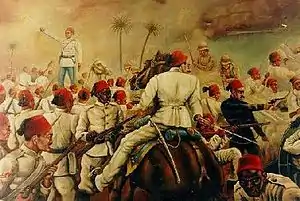Urabi revolt
Ahmed Urabi was originally from a rural village in the Nile Delta. However, he rose to become a military officer later. He was quite popular amongst the rural population in Egypt.[2]
| ʻUrabi revolt | |||||||
|---|---|---|---|---|---|---|---|
 Portrayal of the revolt by The Illustrated London News | |||||||
| |||||||
| Belligerents | |||||||
|
| ||||||
| Commanders and leaders | |||||||
|
|
| ||||||
| Strength | |||||||
|
| |||||||
References
- Featherstone, Donald (1993). Tel El-Kebir 1882. Osprey Publishing. pp. 40–41.
- Huffaker, S. (2012). Representations of Ahmed Urabi: Hegemony, Imperialism, and the British Press, 1881–1882. Victorian Periodicals Review 45(4), 375-405. https://doi.org/10.1353/vpr.2012.0035.
This article is issued from Wikipedia. The text is licensed under Creative Commons - Attribution - Sharealike. Additional terms may apply for the media files.